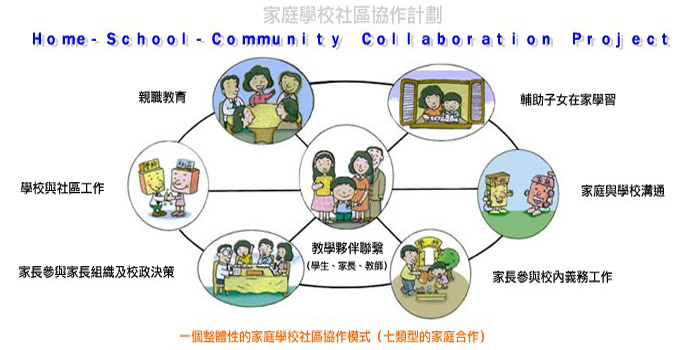Research Projects
Longitudinal Study of Adolescents in Hong Kong (HKLSA) |
Evidence-based School Improvement Projects (EBSIP)
Assessments for Teaching and Learning (AFTL) | International Network of Student Learning Assessment (INSLA)
Assessments for Teaching and Learning (AFTL) | International Network of Student Learning Assessment (INSLA)
Evidence-based School Improvement Projects
EBSIP

簡介 | 研究報告 | 報告撮要 | Executive Summary | 研究理念架構 | 實踐計劃 | 有關資料
親職教育 | 輔助子女在家學習 | 家長與學校溝通 | 教學夥伴聯繫 | 家長參與校內義務工作 | 家長參與家長組織及校政決策 | 學校與社區工作
簡介
家庭與學校合作計劃:
成功指標及成功實踐的尋求
家庭與學校合作計劃:
成功指標及成功實踐的尋求
近年西方國家的教育決策人和教育活動設計顧問工作者,已視促進家校合作是一項教育改革的主要趨勢。本港的《學校管理新措施》、《教育統籌委員會第七號報告書》先後發表,內容均鼓勵家長更加投入學童教育。不少本地研究都顯示:無論來自那一階層的家長,若能更多主動投入學校參與子女教育工作,對家長及子女均有莫大裨益。不過現時本港成功的家校合作例子仍然不多,而同時配合家長教育、師資訓練和學校結構重整方面的研究更少。有見及此,這個計劃嘗試配合本土文化特質,探索優質家校合作的指標;根據現時本港小學的學校現況及需要,為學校設計家長與學校合作的可行模式。
這項計劃的初步目標,是使家校合作計劃達至改善學校整體教育質素,同時又能促進學生的成長,為達致上述目標,我們釐定了以下三個目的:
1. 探索一系列既可靠,又受教育人士重視的家校合作的指標,以評估本地小學實施家校合作計劃之現況;
2. 因應參與小學的實際情況,設計革新的家校合作活動,配合各校不同之需要及期望(這包括學生、家長、教師及社區人士的需求)。
3. 提供適切的培訓計劃及顧問服務──以動員整體家長成為提高學校質素的資源。
這項計劃可分兩階段進行:
第一階段: 發展質素指標階段:這階段我們會進行一連串多層次的調查及個案研究,結果會有助建立家校合作的知識基礎,瞭解不同類型的小學實施家校合作的現況及需要。
第二階段: 家校合作實踐階段:根據研究結果,我們邀請資深教育工作者共同設計家校合作計劃,針對各校不同的需要、期望,提供一連串的培訓和顧問服務,為教師、家長和學生們進行培訓。
Making Home-School Collaboration Work:
In Search of Success Indicators and Practices
In Search of Success Indicators and Practices
With the impetus of the School Management Initiative (SMI) and Education Commission Report No. 7 (ECR7) in Hong Kong, one might expect that parents would have greater involvement in their children's education in local context. Yet little has been done to explore successful home school collaboration (HSC) practices and their implication for parent education, teacher training, and school restructuring.
The primary goal of this project is to explore how to make home school collaboration (HSC) plays its part in improving quality of school education and enhancing the overall development of students. To accomplish this goal, we have three major objectives:
1. To develop a set of reliable and valid quality indicators for assessing home-school collaboration practices and their effectiveness in the local context.
2. To engage a selective group of primary schools in designing a variety of improved and innovative home-school collaboration programs according to the need and desire of the school community (students, parents, teachers, principals and other community members).
3. To tailor make training programs and consultant services that help these schools to implement and evaluate the effectiveness of different models, approaches, and skills in mobilizing parents as resources for enhancing educational quality.
The project will proceed in two phases. The first phase is a readiness phase. We aims at developing reliable quality indicators for home-school collaboration. We will conduct a multilevel surveys, and then followed up with in-depth case studies. The second phase is a transformation stage. Based on the finding of the research, we will join with educators to design innovative home-school collaboration programs according to the needs and expectations of the four participating schools. A series of training and consultant activities will be conducted to empower teachers, parents and students.
The primary goal of this project is to explore how to make home school collaboration (HSC) plays its part in improving quality of school education and enhancing the overall development of students. To accomplish this goal, we have three major objectives:
1. To develop a set of reliable and valid quality indicators for assessing home-school collaboration practices and their effectiveness in the local context.
2. To engage a selective group of primary schools in designing a variety of improved and innovative home-school collaboration programs according to the need and desire of the school community (students, parents, teachers, principals and other community members).
3. To tailor make training programs and consultant services that help these schools to implement and evaluate the effectiveness of different models, approaches, and skills in mobilizing parents as resources for enhancing educational quality.
The project will proceed in two phases. The first phase is a readiness phase. We aims at developing reliable quality indicators for home-school collaboration. We will conduct a multilevel surveys, and then followed up with in-depth case studies. The second phase is a transformation stage. Based on the finding of the research, we will join with educators to design innovative home-school collaboration programs according to the needs and expectations of the four participating schools. A series of training and consultant activities will be conducted to empower teachers, parents and students.
香港中文大學教育研究所研究計劃
優質教育基金資助
優質教育基金資助
Advisers, Consultants and
Project Leader
of the Home School Collaboration Project
Project Leader
of the Home School Collaboration Project
Project Leader
Professor Ho Sui Chu
B.Sc., DipEd, MA (Ed) (CUHK),Phd (UBC) Assistant Professor, Department of Educational Administration & Policy, CUHK.Professor Ho Sui Chu
Program Developer
Tsoi, Lai Yuet-sum,
Director, Home-school Support Consultancy Services Ltd.Tsoi, Lai Yuet-sum,
International Advisors
Professor Joyce L. Epstein,
Director of the Center on School, Family, and Community Partnerships, BaitimoreProfessor Joyce L. Epstein,
Dr. Howard M. Weiss,
Director, Center for Family-School Collaboration, Ackerman Institute for the Family, New York.


